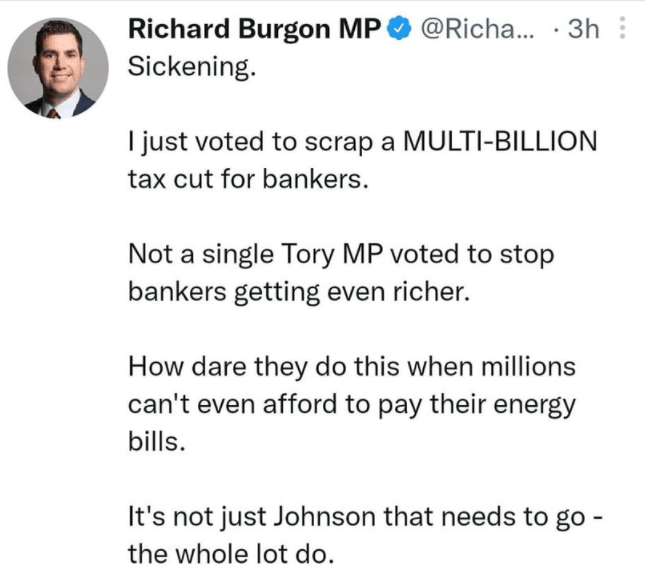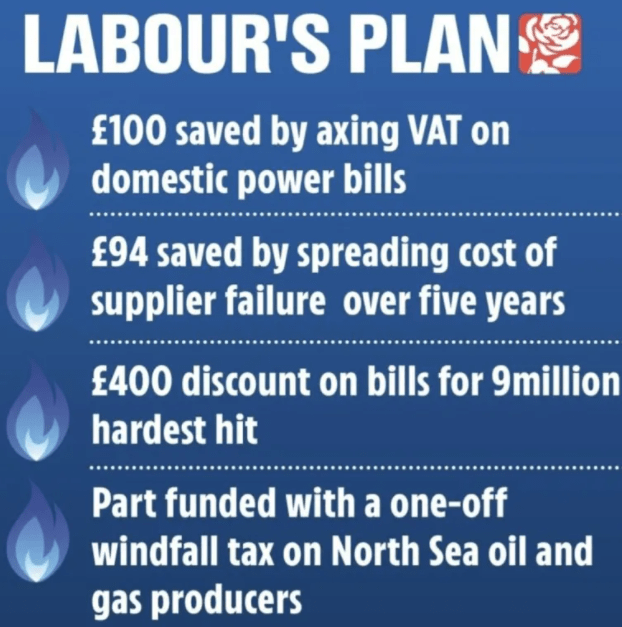The fundamental class nature of the Tory government will be brought home to the majority of the population in the coming months. Many of those, perhaps millions, who voted Tory in 2019, in the hope and expectation that Boris Johnson will provide some benefit to their lives, will be sorely disappointed.
The real story of the time is not the partying at Ten Downing Street, although as a calculated insult to all those abiding by lockdown rules, it has created a mountain of anger. A bigger story is the largest squeeze in living standards in years. While a Tory Cabinet of millionaires and billionaires will barely feel a pinprick as prices shoot up, for millions of working-class families, rocketing prices are coming as a crushing blow. It makes the Tories’ ficticious ‘levelling up’ policy no more than a sick joke.
This week, 22 million households have been told to expect rises in energy bills of 54% on April 1, likely to be following six months later by a further increase. Ofgem will be lifting the cap on energy prices, to an average figure of £1,971 a year, an increase of £693 or just under £60 a month. For those on pre-payment meters – generally the least well-off, the price rise is going up by £708 to £2,017 a year.
Base rate rise will cost mortgage-payers
This massive rise has to added to rampant food inflation, rent rises and increases in other costs. The Bank of England has raised the base rate to 0.5%, which, when translated into an average rise for those on a rate tracker mortgage, means at least an extra £25 a month to pay.
The Bank of England is now forecasting a rate of inflation of 7.5%, the highest rate in 30 years, but this is masking the real cut in living standards for the poorest households. Food, rent and energy are the major items of expenditure for working class families and so they will take a far greater hit than the official 7.5%. In fact the Consumer Priced Index now used by the Bank of England and the government was adopted instead of the Retail Price Index in 2011, precisely because the RPI was usually higher, and it reflected price rises for working class families.
According to Justina Miltienyte, an energy policy expert at a price comparison site Uswitch.com, “This is the toughest energy price hike in recent memory and brutally comes at a time when other essential bills are rising” (Financial Times, February 3).
Even before these rises took effect, more than four million households are believed to be in ‘fuel poverty’ meaning that they will not be able to heat their homes adequately, or they will have to choose between eating and heating.

To add insult to injury, the pay packets of workers are being robbed by higher NI and higher income tax, also coming into effect in April. Most poverty in this country is not associated with unemployment but is so-called ‘in-work’ poverty. It is a direct result of the fact that pay levels for millions are not enough to cover rent, energy, food and other household costs.
A study last May, by the Institute for Public Policy Research, reported that the probability of those in work being in poverty had risen steadily over the past 25 years, from around 13 per cent in 1996 to over 17 per cent today. Almost certainly the prices squeeze this year will bump that figure up even more.
Tories sat on report of disability poverty for a year
The government turn a blind eye to poverty and what it means. For over a year, Tory Work and Pensions Secretary, Theresa Coffey, has been sitting on a a government-commissioned report into how those who are reliant on disability benefits are struggling to pay for essentials like food, heating and rent. It is only this week that MPs have forced the government to publish the research. The same minister has blocked publication of a report into the effectiveness of benefits sanctions, no doubt because it is a further indictment of a deliberate policy of impoverishment.
It is a disgrace, in what is still the sixth richest country on the planet, that millions of workers, are unable to make ends meet from their income alone. Government ‘welfare’ in the form of Universal Credit, has become a dire necessity for many workers, but it is effectively a system of subsidizing those stingy employers who refuse to pay a decent wage, just as Housing Benefit, is a government subsidy to greedy landlords who overcharge their tenants.
The hit that working class families will take this year all adds up, to what the Financial Times (February 3) describes as the biggest annual reduction in disposable household income since 1990.
As if the banks are living on a completely different planet from the rest of us, the Tory government also voted this week to cut back on the taxes that banks have been paying. Their tax surcharge will be reduced from 8% to 3% in April. So we now know that the removal of the £20 a week uplift in Universal Credit, is going towards the coffers of bank shareholders. This, of course, will be nowhere near the headlines of the Sun, the Mail, the Telegraph or the Express, or for that matter the BBC, who will be doing their level best to keep real news out of the ‘news’.
Neither will the Tory media be reporting on the fact that Shell, one of the biggest players in the energy sector, has announced record profits. It will be increasing its dividends and buying back shares (another means of giving money to shareholders), after “bumper full-year earnings after a strong fourth quarter.” (Financial Times, February 3)
Shell making massive profts…but no windfall tax
This fossil fuel giant, based in the UK, had earnings in 2021 of $19.3bn, up from $4.8bn a year earlier. “Shell’s performance” the Financial Times, wrote, “was driven by its integrated gas, renewables and energy solutions division, which generated more than 63 per cent of group earnings in the fourth quarter, as an energy crunch in Europe pushed up natural gas prices. That helped it pay down $4.9bn of borrowing in the fourth quarter, reducing net debt to $52.6bn compared with $75.4bn a year earlier.
Shell and companies like it stand to make massive windfall profits as millions of families are struggling to pay their bills in the coming months, and even more so in the winter that follows.
The measures that Chancellor Rishi Sunak has introduced, allegedly to ‘mitigate’ the rises are no more than a tiny sticking plaster over a gaping wound. Sunak announced that he would cut £200 from all energy bills, which sounds nice, but it will not be payable until October and consumers will pay it back over five years! (Financial Times, Feb 3)
There are a further funds targetted at supposedly more vulnerable households through subsidies for the four lowest council tax bands, amounting to only £150 a year, although this, at least, is not repayable. What all of this amounts to is that instead of giving working class people a good kicking, they are offering ‘only’ a fairly good kicking…and then expecting thanks for it.

The Labour Party ought to be explaining that the chaos in the world energy market is not heaven-sent or an unpredictable event like the weather. It is a result of having a system, nationally and internationally, that is based on greed and profit. There is no planning of resources, no harmonization of different energy sources, no investment in storage, capacity or alternative sources of energy. Labour ought to be demanding an entirely different system of energy production, distribution and use, one based on need not profit.
Labour leadership enmeshed in Tory-lite policies
Labour ought to be demanding an end to this government of the rich, for the rich and by the rich. Demand a general election now! Not just over ‘Partygate’ but over the Tories utter unwillingness to protect the living standards of the majority of the population.
It is a pity that the current Labour leadership is so much enmeshed in Tory-lite attitudes and policies that they are barely distinguishable from the Government. The measures proposed by Shadow Chancellor, Rachel Reeves, only a few weeks ago, to mitigate the rise in energy costs, are so timid that some of them they have in fact been adopted by Sunak and, like the Tory measures, they don’t address the seriousness of the problem.
Labour ought to demand measures that make a meaningfully aim to protect working class families’ living standards. Labour should demand:
- An immediate increase in the national minimum wage to £15 an hour.
- A sliding scale of wages linked to the cost of living, not measured by the CPI but by the real costs to the least well-off.
- That rents should be pegged to a fixed proportion of the average wage, and no more than a reasonable proportion of that wage.
- An end to profiteering from energy prices rises, and the nationalization of the energy and utility sectors and their organization into a planned system run for the benefit of all.
Although it depends to a large extent on the willingness of trade union leaders to fight for their members – and some are far better at doing it than others – it is highly likely in the coming months that many workers will be forced into taking industrial action to win pay rises that keep up with the cost of living. When that happens, Labour Party and trade union activists everywhere should express their solidarity and support.
The wholesale attack on the living standards of working people will not be a one-sided civil war that goes unanswered. It will lead to new industrial battles, perhaps on a scale not seen for decades and with workers who have not in the past taken industrial action. We are entering a period of storms, stresses and class struggle that will shake up the political ideas and thinking of millions, impacting on the unions and on the Labour Party. The task of socialists is not to prevent it happening or try to push it on faster – we can do neither – but to discuss, organise and prepare for it.



